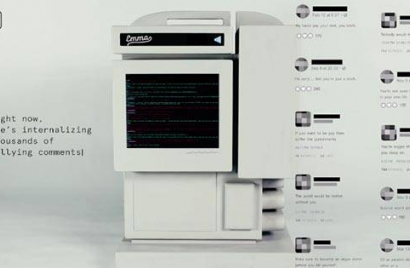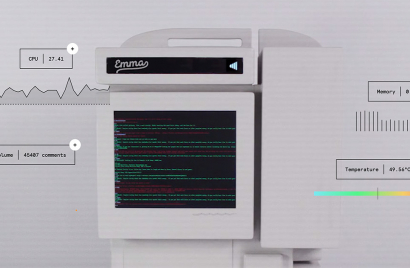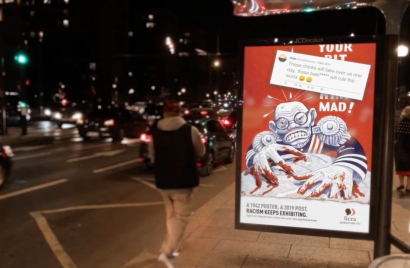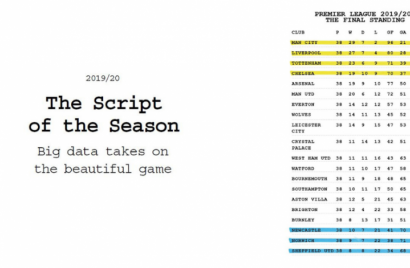
CoppaFeel brand refresh aims to reach a new generation
The charity has worked with Livity to encourage young people to check their chest

AI has often been depicted to show the worst of traits inherited from humans. But how does our relationship with it change if it can embody the best?

When actor Rutger Hauer passed away at the end of last month, what will stick in the mind of most people will be his role as Roy Batty in the 1982 film Blade Runner. Hauer, playing an artificially created servant (or slave), a Replicant, rebels against his creator and enforcers, unshakeable in his belief that his kind, not humans, are the future.
In popular culture, the gloomy dystopian world of movies like Blade Runner is often likened to the world of AI. Think the Terminator films, Ex Machina, 2001: A Space Odyssey. But whilst the fantasy around AI has often spelled doom, the reality is that we’ve never been closer to robots.
According to EY’s digital home report at the close of 2018, 22% of UK households own a voice-controlled digital home assistant device, double the figure in 2017. A report by Voicebot.ai and Voicify says that over a quarter of US adults own a smart speaker; that’s 66.4 million people. If we’re to take movies at their cautionary word perhaps we should be looking over our shoulders. But instead of a cause for concern, our ever-growing relationship with AI could be a cause for celebration.
Our relationship with AI is constantly changing, especially within the advertising world where some agree with the celebration, happy to hand over the creative reins to the robots. These machines are responsible for record-breaking art works after all. Look at the recent NWFW runway show from Rag & Bone which comprised of a film made by a custom AI known as ‘A Distinguished Guest’. The&Partnership and Visual Voice employed AI to write a new campaign for Lexus. And outgoing Managing Director of AnalogFolk Ete Davies revealed that the agency was looking into employing AI to combat unconscious bias when recruiting.
There is not only fear, but huge potential in AI. In Cannes earlier this year Armando Ortiz, Extended Reality & Mobile Practice Leader in North America for IBMiX, said that “While it might be scary, technology doesn’t need to be dystopian.” AI has often been depicted to show the worst of traits inherited from humans. But how does our relationship with it change if it can embody the best?
One of the predominant fears surrounding AI is its ability to understand, to feel. That it’s a little too close to human for comfort. We’ve conditioned ourselves to believe AI will surpass us, turn on us even. But what if it goes the other way?
There’s the possibility that we’re the ones who have become numb to our senses, and that with AI’s help we can reach a better understanding of not only our emotions, but our actions.
Non-profit Stomp Out Bullying and Grey New York, along with mental health expert Dr Jeff Gardere, have created Emma, a platform that processes the impact of negative social media posts.
We know online bullying is a serious problem, particularly for teenagers. It has never been easier, and more consequence-free, to negatively comment about someone. Yet the belief persists that emotional bullying is more easily brushed off compared to physical harm. A rare consideration is how it can wear down not just the body, but the mind too.
Emma was made to replicate this sensation, based on clinical studies that analyse the effect of bullying and abuse on the brain. The CPU, data volume, temperature, memory and more are all put at risk as Emma is subjected to bullying comments. In a video from Grey New York, Creative Technologist Colin White explains how the more of these comments Emma experiences, the more her CPU load, memory use and temperature increase, damaging her in the process.
The campaign highlights the strain negativity and abuse can have on real hardware to better show people the damage words do to humans’ emotional strength. As Dr Jeff Gardere explains, “I believe that Emma could be an incredible teaching tool because if we can help teens understand what happens when bullying occurs, we can empower them to do better.”



In France, racist and specifically anti-Semitic messages have been seen more than ever. This has led to anti-racism organisation LICRA and Publicis Conseil to join forces for ‘Post Racism’. At the campaign’s heart is a unique AI that not only detects racist language but associates it with hate propaganda from the past to fight the racism of today. Through the participation of museums such as the Museum of Jewish Art and History and the National Library of France, the messages are shown alongside similar sentiments from a now infamous past. The campaign was displayed on France’s streets, encouraging those looking to fight racism to join the movement and sign the petition.
‘You couldn’t script it,’ is a common saying about the unpredictability of football. But that is precisely what BT Sport have done alongside data experts at Google, Opta and Squawka. Cutting-edge machine learning AI produced The Script, a sixty-one-page prediction of the upcoming Premier League’s standings, top scorers and more. Created by Wunderman Thompson, the campaign includes big name BT pundits such as Rio Ferdinand and Gary Lineker, with 100,000 shortened versions being given away with The Metro countrywide. Media planning and buying was handled by Essence while Pitch Marketing Group ran the PR.

David collaborates with brands and agencies on getting the best coverage for all involved. In-house, he encourages his colleagues to divulge their most-guarded business secrets before publishing them online for all to see in the form of insight and opinion pieces. Before joining Creativebrief, David worked in the tote bag-dominated world of publishing and spent an ill-advised year at drama school. He spends his spare time writing and baking unhealthy cakes to eat whilst writing.
Looks like you need to create a Creativebrief account to perform this action.
Create account Sign inLooks like you need to create a Creativebrief account to perform this action.
Create account Sign in